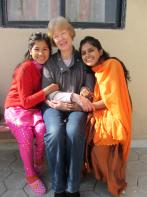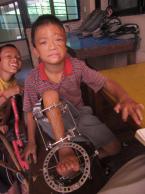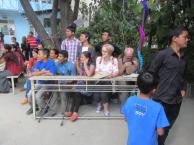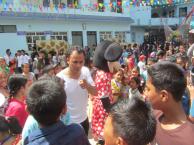Profile
Blog
Photos
Videos
After all the days we have put in at DNC we are beginning to see where some real opportunities lie. But we feel that it means separating children out for attention that suits them personally. This must mean ignoring other children for a while which is hard. But only by this means can we really help them to understand English. As we've said before, they learn letters and words by rote, chanting and constant repetition. They can read to us but have no understanding of what they are reading. Older ones are set homework which they don't understand, asked to create sentences when they don't know what a sentence is. This means that their thinking ability is poor and other westerners we've spoken to say the same. So our aim is to assist understanding
So the box of Noddy jigsaws has proved an unexpected opportunity. Some younger children seem to have no experience of jigsaws and even 8 year olds have no idea of their purpose other than fixing random coloured shapes together. When you look at their backgrounds this isn't surprising. Some have been picked up from the side of the road, some found crammed in children's homes and mental institutions, some left at home alone because they can't help the family. Why on earth should they have ever come across a jigsaw? Walking the backstreets of Kathmandu we wonder how any Nepali children have the advantages a Noddy jigsaw can bring. We have to start by explaining (in a foreign language to them) that the pieces must go together to copy the picture. It is very satisfying when you see they've caught on. Then language. I point out my shirt. Now where is Noddy's shirt (in the picture)? What colour is Noddy's shirt? Where is Noddy's red shirt (in the puzzle pieces)? They've done it! This has to be done one-to-one and smart kids who interfere by grabbing the pieces have to be told to go away which is just as difficult.
We're devising a games with letters, words or phrases on cards which they can put together to make words and sentences. They turn over words and with some help see if they make a word. Or they turn over simple words to see if they can make a simple, often silly, sentence. We hope they will understand the humour and this will help in structuring fun sentences. We've done this with numbers and it's been greeted with great enthusiasm.
And English homework must be our priority. The grammar in their text books is dreadful. They are set questions which Kath and I don't understand because the English doesn't make sense. Naina and Sanjay are in the same class and had the same homework based on the "song" All Things Bright and Beautiful. (Surely a simpler poem could have been found!) They were asked questions about rhyming words and asked to create new sentences from these rhyming words. Neither boy knew about rhyming words or what a sentence was. Here we can be of constructive help.
Most of the younger children seem terribly behind for their age but most are very bright and catch on very quickly. And we keep looking at the older ones, personable and intelligent, who must have been similar young ones once.
As we and the children get to know each other well we get to know their characters, talents and their sense of humour. We have to provide fun as well as all work. But the DNC children find work fun. They are eager to learn and want us to help them. So to this blog we've added a few photos of the children having a bit of fun. And here's a counting question from a maths book for you. A boy has shot some of the targets . . . .
"How many left is their to shoot?" Can you spot 3 errors in this sentence? With such things common in their textbooks, how can they learn good English?
Embroidery equipment has not been a success so far. The girls associate needlework with work, with women sewing for a few rupees. The concept of developing a skill such as needlework as a leisure activity, for the fun of it and sense of achievement is beyond their comprehension. We're back to this cultural thing about retirement and leisure time that they don't understand.
A new little boy has come to DNC this week and I will tell you about him as he is not untypical of new children. His name is Iyug - pronounced 'eye-oog'. He is about 6 years old and is dreadfully disfigured by burns which extend from his face, all down one side, his hand, arm, leg and foot. We met him on his first day and he was bewildered by his new situation and all the new things and people around him. But, as has to be the case with so few staff, he was very much left to his own devices. In the late afternoon Kath was asked if he could sit on her lap because he was crying. Why? Because he's homesick. I gave him rides on the bike which he loved but he was freezing cold as he only had the clothes he arrived in. He has been sponsored for several years by an Australian lady who has, I think, paid for several major operations. His parents are alcoholics and the little boy has been much abused. Money given to his parents for him has been spent on booze. Eventually the decision was made to remove him from his parents and he is now safe at DNC. Over the last few days he has begun to come out of his shell. He helped me to mend a bike which he seems to know all about. He even gathered up the tools afterwards to put them away. He has quickly learnt a few important English words like cycle, my turn, etc. He's begun charging around on other people's wheelchairs and bashing into everything. He's a real little boy who rushes everywhere with a run which is a rapid hop and skip. We've seen other children take him under their wing, do up his shoe laces etc, so he's becoming part of the family and he's beginning to laugh. He gets excited when we arrive about mid-day. We'll see if we can buy him some new shoes as his present ones are far too large. But his life so far has been unimaginable and we wonder what he thinks about when he lies alone in his bed at night.
In Nepal there is no state pension, no dole, sickness, child or other benefits. All you get, of this sort, is education from 5 -12, and medical aid. But on a visit to a doctor or hospital you must pay the first 1000 rupees (£8.40) and this is beyond the means of many families. Perhaps family or friends will club together to raise it in serious cases. What happened to little Iyug when disaster struck we dread to think. There is a good burns hospital in Kathmandu but their aim is only to get the body functioning again as best they can. Plastic surgery cannot be afforded and on discharge there is almost nothing in the way of physiotherapy or counselling.
We can leave all the cares and joys of DNC behind and on Friday we will be at a big Hindu wedding and on Sunday afternoon, at the wedding party. On Monday we're off for 9 days to the beautiful resort of Pokhara and to the Chitwan National Park. We'll tell you all about it on our return.
- comments











Trish What a wonderful job you're both doing - your blog is fascinating and I'm sure little Iyug will continue to flourish under your care. Have a great 9 days off!